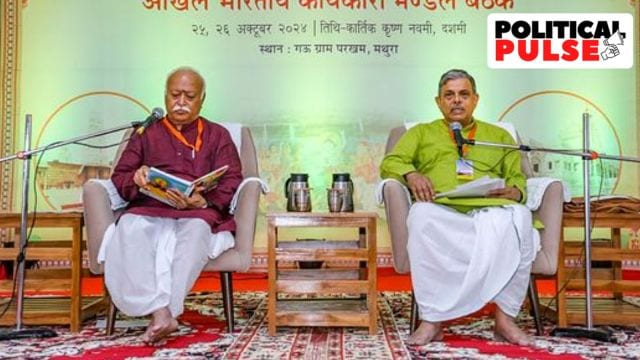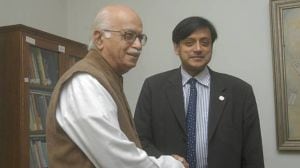As Andhra and Tamil Nadu talk of more children, a look at the different aspects of Sangh Parivar’s view
Senior Sangh leaders have openly batted for Hindus having more children and agreed with southern states over rising “regional imbalance”. But population control also remains top on agenda.
 The Sangh has spoken about the population debate in the past. (PTI Photo)
The Sangh has spoken about the population debate in the past. (PTI Photo)The conversation on ageing population, demographic change, and political representation of South India is again front and centre. Last week, expressing concern over the ageing population in his state, Andhra Pradesh Chief Minister N Chandrababu Naidu said that his government was contemplating a legislation to incentivise families to have more children.
Days later, Tamil Nadu CM M K Stalin, referring to a potential reduction of South India’s share in parliamentary seats after delimitation, remarked: “Why not aim for 16 children?”
While the two CMs currently sit on opposite sides of the political divide at the Centre, they appear united in their concern.
They also seem to echo what has been heard from the Sangh Parivar multiple times over the years — albeit for different reasons.
There are three strands to the Sangh’s stance on population. Its senior leaders have spoken of “population imbalance” and openly batted for Hindus having more children in order to balance a “rising population of Muslims”. The Sangh has also agreed with southern states over rising “regional imbalance” vis-a-vis population growth. At the same time, population control also remains on top of the Sangh’s agenda.
‘More Hindu children’
Speaking at an event in 2005, former RSS chief K S Sudarshan had said: “Do not get into the trap of two-child or one-child norm. If you go by the one-child norm, in the next 120 years, there won’t be any successors in your family. You should not have less than three children and if you have more, the merrier it is.”
In 2013, at an event in Kochi, RSS general secretary Dattatreya Hosabale, said “bigger Hindu families would prevent minorities” from gaining the upper hand in population in certain parts of the country. He added that elite Hindus should “seriously review family planning”.
In 2015, VHP leader Champat Rai said at a press conference that family planning “was no more a personal matter for Hindus”. He went on to suggest that “if they continued to remain content” with a single child, “Muslims would take over the country”.
The regional concern
In its July issue this year, RSS-linked weekly Organiser echoed the concern of southern states on delimitation and political representation. Opposition parties, particularly those who do well in the South, feel a delimitation exercise based on population could skew elections in favour of parties in the more populous North as it would give the North more parliamentary seats.
“Regional imbalance is another critical dimension that will impact the delimitation process of the parliamentary constituencies in the future. The states from the West and South are doing relatively better regarding population control measures and, therefore, fear losing a few seats in Parliament if the base population is changed after the census,” Organiser’s editor Prafulla Ketkar wrote in an editorial.
Ketkar argued that the country needed a policy to ensure that population growth does not disproportionately impact any religious community or region, which, he says, “can lead to socio-economic disparities and political conflicts”.
Demography: Dividend vs imbalance
In his 2022 Vijayadashmi speech, RSS chief Mohan Bhagwat raised the issue of “population imbalance” and asked for a comprehensive population control policy that applied to all without exception. “…When there is population imbalance, new countries are created,” he said.
The RSS chief also underlined that India’s large young population could be leveraged but cautioned that the country needed to plan for the nation when this population ages in the next 50 years.
In the interim Budget speech in February this year, Union Finance Minister Nirmala Sitharaman even announced plans to set up a high-powered committee to consider the challenges arising from fast population growth and demographic changes. The committee has not yet been formed.
The numbers
While the 2011 Census does record a higher birth rate among Muslims compared to Hindus, the birth rates of the two communities are said to be progressively converging. The decline in the decadal growth rate of Muslims between 1991 and 2011 has been recorded to be higher than Hindus.
According to the latest National Family Health Survey (NFHS) data, the fertility rate in India stands at 1.99. The fertility rate for Hindus stands at 1.94. Among SCs, it is 2.08 and among STs it is 2.09. For OBCs, the fertility rate is 2.02, almost comparable to the national rate, while for non-SC/ST, non-OBC castes it stands at 1.78. Among Muslims, the fertility rate has been calculated to be at 2.36.
Many in the RSS have even argued for a legislation that could keep Dalits and tribals out of the purview of a population control law. Underlining population control as a “sensitive issue”, a senior RSS office bearer told The Indian Express: “A large section of Hindus too have higher fertility because of poverty and illiteracy. There are several models for population control. One among them also talks about Scheduled Castes and Scheduled Tribes to be left out of the purview of a population control law. All models must be considered to arrive at a decision.”
Legislative attempts
In 2017, the Assam Assembly passed the “Population and Women’s Empowerment Policy of Assam” that was further amended in 2021 to exclude those with more than two children from applying for government jobs.
In 2023, the Uttar Pradesh Law commission came up with a proposal that would deprive those with more than two children of government subsidies. This is still being considered.
At the Union level, there has been ambiguity as far as the stated government position is concerned.
In 2019, Rajya Sabha MP Rakesh Sinha, seen as associated with the RSS, moved a Bill to enforce a two-child norm. He proposed incentives for those adopting the small family practice and penalties for those contravening it.
In April, while replying to a debate on the Bill, Union Health Minister Mansukh Mandaviya said that instead of using “force (jabran)”, the government had successfully used awareness and campaigns to achieve population control. He urged Sinha to withdraw his Bill, which the latter did.
In response to a petition in the Supreme Court seeking a two-child norm in the country, the Centre in 2020 expressed its unwillingness to bring in a coercive law and said it would be “counter-productive”.
However, in May this year, Union Minister Prahlad Singh Patel said a law for population control would be brought in soon.



- 01
- 02
- 03
- 04
- 05




























